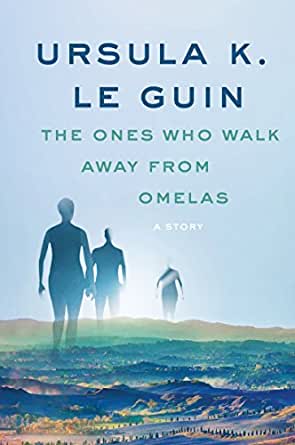I’ve seen some posting on “The Ones Who Walk Away from Omelas”

Ultra-compact analysis:
1. Le Guin asks YOU to imagine a Utopia with whatever in it YOU think would make people happy
2. This Utopia will have all those pleasures (including sinful ones) with NO DOWNSIDES.
3. You don’t believe it, obviously.
4. She creates a negative condition that magically eliminates the downsides: constant neglect and abuse of a single innocent child.
5. Most people in Omelas end up accepting this, despite not liking it.
6. Post-hoc rationalizations are given – the child can’t really be saved because of its condition, its a necessity, the overall happiness is greater, etc.
7. Some people walk away – the unreliable narrator wonders why, since the narrator is on the side of the people who stay
This is a moral tale about the limits of Bentham’s Hedonistic Calculus. Presented in the extreme – unlimited pleasure and extreme pain localized into one individual – the question is whether most people will tolerate it, or not. The real question at the end, of course, is whether happiness is possible at all when you are aware of the pain it costs another person, or if you can live in a state of cognitive dissonance.
This isn’t an endorsement of child abuse – the Utopia is a dystopia, of kinds. Le Guin uses it to punch you in the face. The truth is, many modern people already do this calculus, just not at this extreme and with such obvious immorality. Lots of us wear clothes made by kids in foreign countries.
It’s an old story of the scapegoat and whipping boy. This story is interesting but doesn’t break new ground except in its unique execution. Even Star Trek has done multiple episodes on the problems of utilitarianism.
The most obvious criticism is that the ones who “walk away” do just that – walk away. They do not go and save the child. This might be because that would make an actual story with characters and a plot, rather than what Omelas actually is (a kind of Aphorism) and Le Guin didn’t want to write that book. Or it could be the ones who walk away are unwilling to upset the others. We don’t know, but we’re missing the third option – destroy the system.
The biggest criticism, however, is really in the assumptions made by the story, which are all firmly rooted in materialism. The basic idea that utopia would be pleasure without downside is the problem. We don’t believe in Omelas not because we need a downside, but because we know pleasure does not bring happiness, with or without downsides.
The Christian worldview rejects the simplicity of such a system. True happiness and peace come from communion with God, not from earthly pleasures. Omelas would be like Sodom, depraved and evil, even without a tortured child as a “downside” to hedonism.
So, the entire setup is reflective of boomer culture exiting the 60s – obsessed with pleasure but keenly aware of downsides, yet in denial of the greater complications of the fallen world. In a way, the boomers lived in Omelas, and the tortured child would be their descendants.
Buy my books:





Pingback: Sensor Sweep: Galaxy’s Edge, Excalibur, Wilbur Smith, Shadowrun – castaliahouse.com